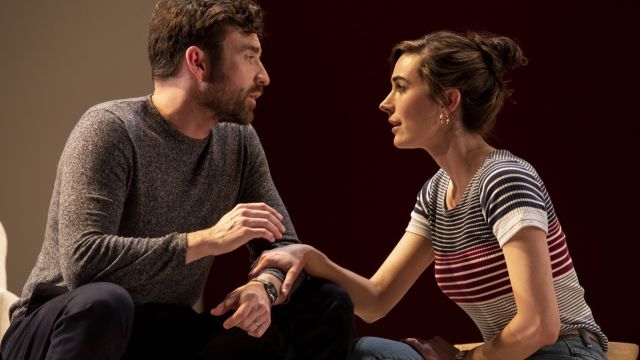The Real Thing
The Real Thing was a big hit in 1982. Britain’s Tom Stoppard was applauded for embracing the theme of heart-felt love and fidelity, and breaking from his earlier, drier plays crackling with nihilistic philosophising.
As Stoppard liked to re-quote, “I’m a man of no convictions – at least I think I am.”
And so instead he created Henry, an articulate playwright, unsuccessfully trying to dramatize romantic love without resorting to banality or lewdness. Henry’s own marriage to Charlotte, an actress, is freezing over, but even when he defies principles and absconds with Annie, another actress, his writer’s block remains.
Only Stoppard could elevate such a seemingly inward, backstage plot into a linguistically electric exploration of love’s escape and trust, possession and boredom, sparked with such metatheatrical wizardry and wit. For these characters from the theatre, capturing the ‘real thing’ is both a human and literary mission, and Stoppard’s theatrical tricks delight in upsetting our earlier presumptions.
The lovers quarrel fiercely but are never lost for words and, of course, with reserved British understatement. Except for one kicked cushion, there’s hardly a word in anger. The Real Thing is intellectually exhilaratingly, even after two hours, but oddly unmoving.

Simon Phillips’ cool, pacy production expertly serves this British restraint, with a strong cast crisp in delivery and projection. Johnny Carr is mesmerising as the almost insufferable master wordsmith, Henry, with Geraldine Hakewill convincing as the finally faithless Annie, and Rachel Gordon strong as Henry’s abandoned wife, Charlotte, who happily turns to promiscuity.
Charlie Garber is Annie’s unaware husband, Max, another actor; Shiv Palekar charms as a young actor infatuated with her; Dorje Swallow is the playwright strong on political convictions but less on talent, whose work Annie wants to promote; and Julia Robertson is Henry’s punky (but no less articulate) daughter.
Charles Davis’ subtle costumes cross 40 years without being heavily period – the play, except perhaps for its singular focus on sexual fidelity, stands the test of time. Davis’ revolving and sliding set of sophisticated living rooms, beautifully lit by Nick Schlieper, brings action and speed to what is a classic flight of words.
Martin Portus
Photographer: Lisa Tomasetti
Subscribe to our E-Newsletter, buy our latest print edition or find a Performing Arts book at Book Nook.

